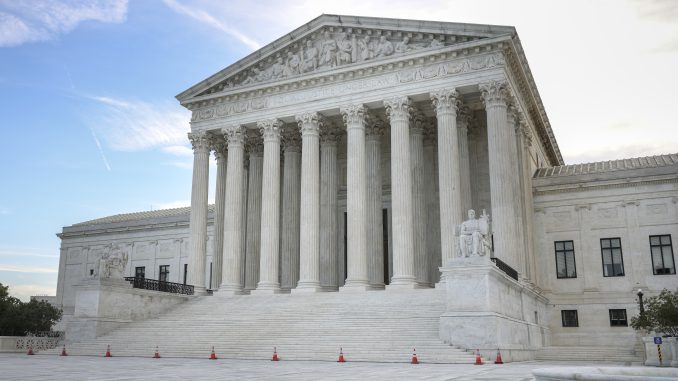

The U.S. Supreme Court is seen on October 05, 2021 in Washington, DC. The Court is holding in-person arguments for the first time since the start of the COVID-19 pandemic. (Photo by Kevin Dietsch/Getty Images)
OAN Newsroom
UPDATED 6:49 PM PT – Tuesday, October 5, 2021
A dispute between Mississippi and Tennessee has resurrected as the Supreme Court went back into session for the start of a new term. The debate, which originated in 2005, resumed on Monday when Mississippi revealed they were seeking more than $600 million as they accused Tennessee for pumping excess water near the border from an aquifer shared between the state lines.
However, Mississippi’s Deputy Solicitor General John Coghlan wanted to make clear equitable proportion was not the issue.
“Mississippi does not claim the defendants are taking more than their fair share of ground water,” he stated. “Rather, Mississippi’s case turns on a different question. Do defendants have the right to control ground water while it is located in Mississippi’s sovereign territory?”
Mississippi has accused Tennessee of pumping more than 37 million gallons of water per day over state lines. The state added one inch of movement per day translated into tens of millions of gallon per day.
🚨🚨Groundwater Case at U.S. Supreme Court🚨🚨
Oral Arguments Begin Today!https://t.co/XpSyft94EY
— NGWA (@ngwatweets) October 4, 2021
However, the attorney for Tennessee argued it didn’t work that way as the aquifer was equally proportioned in each state. He accused Mississippi of recently increasing its pumping, which allowed them to extract as much water as necessary.
“Their claim is that they think they have an ownership right that entitles them to charge Tennessee for water,” David Frederick explained. “We think the Court should say no, that’s not the correct statement of the law.”
Chief Justice John Roberts, who has been skeptic of the issue, proceeded to ask Mississippi about equitable apportionment not pertaining to water to make sense of their arguments.
“Let’s suppose they’re a valuable resource. If they were in Mississippi and crossed into Tennessee and Tennessee seized them at that point, would that be damaging Mississippi?” he questioned. “Or could Tennessee say they’re on our territory, they’re under our physical control, we can exercise dominion over them period.”
Justice Roberts suggested water was an interstate resource subject to equity proportion and if sources that migrated between two states were shared, one cannot simply claim it as theirs. The justices are now expected to form their final ruling by next spring.





Be the first to comment